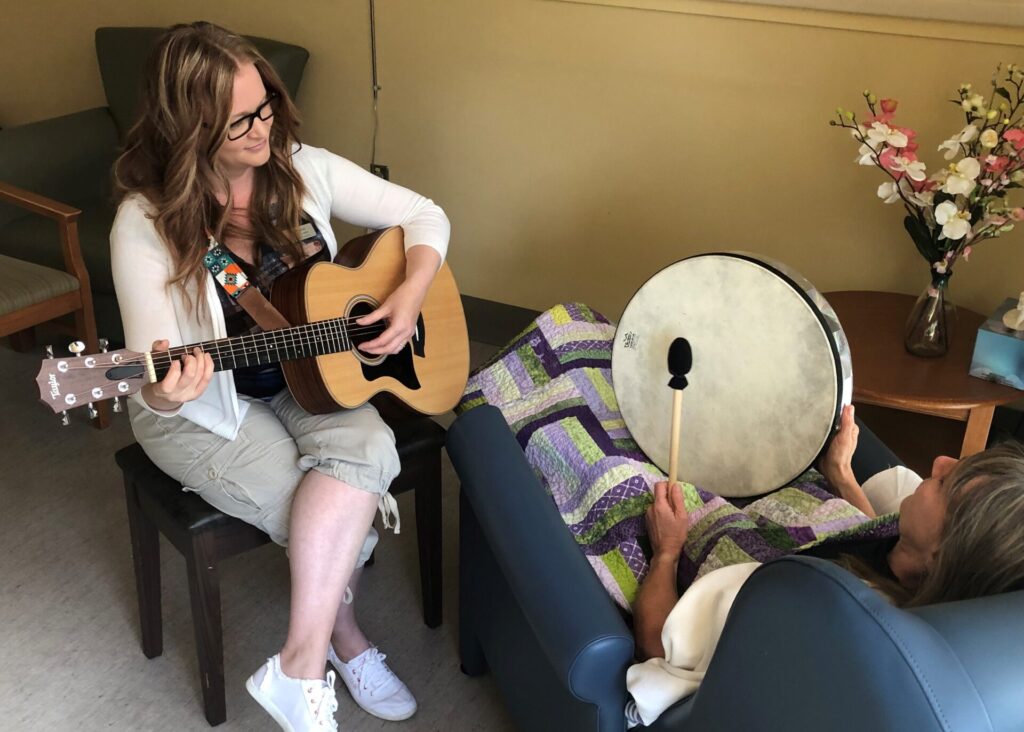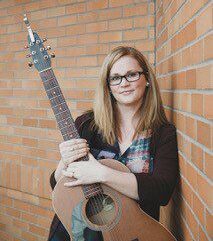Anyone who has belted along with a ballad intuitively knows the power of music.
Music is what feelings sound like. That’s how Maryann Burrows thinks about it. As the music therapist at Victoria Hospice, Maryann’s job is to harness the emotional power of music. She breaks it down to its core elements and administers it to meet patients’ needs, whether emotional or physical.

A sharp pain may be reflected by the sound of violins, while low drums may be just the right anecdote for a dull ache.
It’s validation therapy, explains Maryann. “The essence of what we need as humans is to know that whatever we’re feeling, it’s completely OK.”
Music therapy is one of the emotional and spiritual supports offered on the Inpatient Unit at Victoria Hospice. The interdisciplinary care at hospice includes counsellors, social workers and a spiritual-care advisor who work alongside nurses and physicians.
Music therapists are musicians trained in the psychology and neuroscience of music by recognized university programs and certified by the Canadian Association for Music Therapists. They work with people with a wide range of conditions, such as developmental disabilities, or mental illness.
Music therapists have been working in palliative care settings for more than 35 years, with demonstrated benefits to patients’ sense of well-being and relaxation. Music Therapy can reduce anxiety and perceptions of pain and help patients process emotion and meaning.
“Some things are just unspeakable,” explains Maryann. Music can offer an indirect, gentle way in.
At hospice, Maryann aims to capture her patient’s feeling through music, reflect it back to them, and work with it. Sometimes it’s joy, beauty, and humour. But other times, it’s pain, fear, and denial.
“I can verbally tell you that what you’re going through is valid, but music can give this message like a warm blanket, wrapping its comfort and care around you like nothing else can. And once we validate whatever the feeling is, we can transform it into something new, towards healing.”

Sometimes that shift happens with the help of a curated playlist. But there are many other tools in a music therapist’s toolbox, such as singing or playing guitar. Recently, Maryann picked up the ukelele, as it’s an easier instrument for patients to hold and to learn.
Music composition is another powerful tool. Maryann guides the patient through the process of creating their own lyrics, melody, choosing chord progressions and time signatures. For many patients, it’s a way to explore difficult feelings or to leave a musical legacy.
Maryann recalls a patient suffering from a serious illness who couldn’t acknowledge what was happening to her.
“Writing provided her a safe container to explore what was going on for her indirectly and through metaphor,” she says. “It allowed her to build her own inner resources through the main character of her song. She could identify with the character’s strength and resilience to get through a hard time and begin to acknowledge her own ability to do the same.”
They ended up recording the song and hosting a listening event. “By the time we wrapped, she was fully engaged with her physicians and able to participate in decisions about her health care.”
Music therapy plays another role as a patient moves closer to death and the body begins to shut down. Often, a patient goes into a state of apnea, or shortness of breath. In these instances, Maryann provides a steady, gentle beat. It gives the body’s rhythms the support they need to naturally align, regulating breath, heartrate and blood pressure while calming the nervous system, making the physical process of dying more comfortable.
For Maryann, her relationship to music is personal.
“Music has saved me a few different times,” she says. “It is so effective, and so powerful. I want to connect people with that and help them feel resolved as they complete their lives and feel ready to transition to whatever comes next.”
Music therapy at Victoria Hospice is just one of the many vital programs made possible thanks to the generosity of donors and community partners, including the CRD Arts & Culture Support Service, and the Music Heals Charitable Foundation.